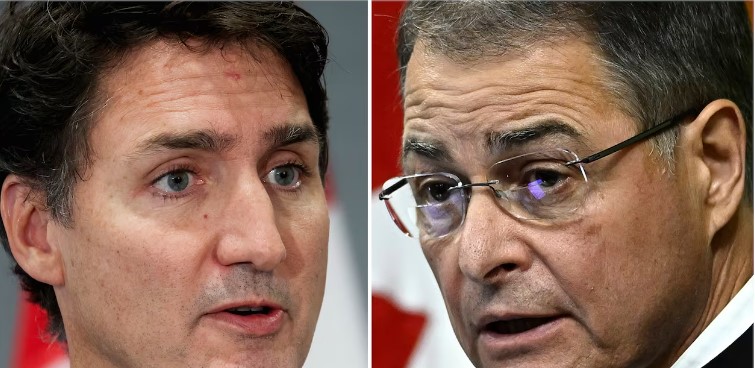Virendra Pandit
New Delhi: As Canadian House of Commons Speaker Anthony Rota resigned amid a row over praising a Nazi veteran, pressure built up on Prime Minister Justin Trudeau to follow suit after Russia, Israel, Poland, Sri Lanka, and Bangladesh joined India with different controversial issues riling the North American country for over a week now.
Ironically, Canada is the largest shelter for the ‘Khalistani’ extremists, and also the second largest to the Ukrainian diaspora, and has come under a cloud because of its ruling party’s support to them.
Speaker Rota resigned on Tuesday, days after publicly celebrating a Ukrainian veteran who fought for the Nazis during Second World War.
During a visit to Parliament by Ukraine’s President Volodymyr Zelensky last week, Rota hailed an elderly Ukrainian immigrant from his district as a hero, prompting a standing ovation.
But little did he know about the man he was hailing, and the House giving a standing ovation, with Trudeau and Zelensky clapping.
When exposed, Rota faced growing pressure to resign after it was revealed that the veteran had served in a Nazi-linked military unit. Yaroslav Hunka, a 98-year-old Nazi war veteran, became Rota’s nemesis. Ottawa claimed it was not ‘thoroughly aware’ of the Ukrainian man’s Nazi military background.
With this revelation, Poland is now exploring legal and diplomatic options to seek the extradition of the Nazi war veteran who fought for a Nazi military unit, Polish Education Minister Przemysław Czarnek said in a statement.
“In view of the scandalous events in the Canadian Parliament, which involved honoring, in the presence of President Zelenskyy, a member of the criminal Nazi SS Galizien formation, I have taken steps towards the possible extradition of this man to Poland,” Czarnek said on social media platform X (formerly Twitter).
He said he had tasked the National Historical Research Institute to see if Hunka was wanted for crimes against Poles or Polish Jews.
Hunka, a Ukrainian-Canadian, was invited to the Canadian House of Commons on September 22, in the presence of Ukraine’s President Volodymyr Zelenskyy, and given a standing ovation. The Speaker of the House, Anthony Rota, went on to describe him as a “war hero.”
After it surfaced that Hunka was actually a member of the Waffen-SS Galicia Division, which comprised of Ukrainian Volunteers who fought for Nazi Germany’s armed forces against the Soviet Union in the Second World War, the Canadian government switched to a damage control mode.
Rota issued an apology on September 25, saying that he was not aware of Hunka’s association with the Nazi forces. “I have subsequently become aware of more information which causes me to regret my decision to do so.”
Prime Minister Justin Trudeau also expressed regret, noting that “this is something that is deeply embarrassing to the Parliament of Canada and by extension to all Canadians.”
“It’s extremely upsetting that this happened. The Speaker has acknowledged his mistake and apologized,” Trudeau added. His office also denied the reports which claimed that a private meeting took place between him and Hunka.
“It is with a heavy heart that I rise to inform members of my resignation as Speaker of the House of Commons,” Rota told lawmakers from the parliamentary floor on Tuesday.
As Israel piled up pressure on Canada, he expressed his “profound regret for my error” and the pain he caused to Jewish communities in Canada and around the world. The Friends of Simon Wiesenthal Center said Hunka actually served in the 14th Waffen Grenadier Division of the SS,” a Nazi military unit whose crimes against humanity during the Holocaust are well-documented.
The Jewish advocacy group called the incident “shocking” and “incredibly disturbing…This incident has compromised all 338 Members of Parliament,” the organization said, adding it had “handed a propaganda victory to Russia, distracting from what was a momentously significant display of unity between Canada and Ukraine.”
Russia also accused Canada of harboring such elements and the Ukrainian government of ‘espousing’ Nazi ideals, despite Zelensky being Jewish and losing family members in the Holocaust, and the controversy was likely to add fodder to that narrative.
Several political parties in Canada urged Rota, a Liberal lawmaker, to step down.
Rota, who was first elected in 2004 and became speaker in 2019, apologized on Sunday, saying that he had “subsequently become aware of more information” which caused him to regret his remarks about Hunka.
“This initiative was entirely my own… I particularly want to extend my deepest apologies to Jewish communities in Canada and around the world,” he said.
On Monday Prime Minister Justin Trudeau, himself fighting an existential crisis after spoiling relations with India over the Khalistani issue, called Rota’s remarks ‘shameful.’
The main opposition Conservatives slammed the Trudeau administration for failing to properly vet Hunka, despite claims it had no advance notice he’d been invited to the event.
Zelensky’s visit to Canada was the third leg in a tour aimed at bolstering international support, after addressing the United Nations and visiting US President Joe Biden in Washington.
During the visit, Trudeau pledged additional aid to Zelensky’s war-torn country.
Canada has the world’s second-largest Ukrainian diaspora and Zelensky, in his speech to Parliament, thanked Ottawa for backing Kyiv since the Russian invasion of Ukraine in February 2022.
Moscow has accused Ukrainian leaders of being “neo-Nazis” and sought to justify the war with the need to “denazify” its neighbor.
Interestingly, the exposure of this ex-Nazi episode gave some respite to Trudeau and briefly shifted focus from him to Rota. With the Speaker’s resignation, the focus is back on the PM. Not just India, but also its neighbors Sri Lanka and Bangladesh continued to expose Canada for sheltering their respective persona non grata.

